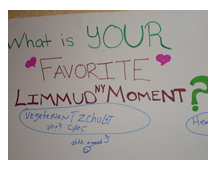Joel Lurie Grishaver
 I was in England for Limmud UK. I learned and taught there. Over and over again people asked me, “How was your Limmud?” The radical insight here being the “your.” Limmud is a conference of almost 3,000 people who spend about a week studying. There are hundreds of sessions and limitless possibilities. Colloquial language understands that everyone has their own experience at this conference. What is good for one learner may not be for someone else.
I was in England for Limmud UK. I learned and taught there. Over and over again people asked me, “How was your Limmud?” The radical insight here being the “your.” Limmud is a conference of almost 3,000 people who spend about a week studying. There are hundreds of sessions and limitless possibilities. Colloquial language understands that everyone has their own experience at this conference. What is good for one learner may not be for someone else.
The how was “your.” Lesson is one we need to apply to all forms of Jewish education. In both our practice and in our dreaming and planning, we need to remember that there is no single student. Each of our learners will have a unique experience. No matter what we plan, no matter what technology we bring to bear, we need to understand that different students have different experiences.
How do you individualize educational experiences? Basically there are two ways. The first is to do the Limmud thing—that used to be the CAJE thing—that is, to offer lots of different choices. The other option is good teachers.
Where many have given up on teachers, Bill and Melinda Gates and their foundation, are investing billions of dollars in the American educational system, most of that devoted to identifying and helping good teachers (see Measure of Effective Teaching Project). Whether we use I-Pads and apps, or skype to save carpool time, it matters who is on the other end to explain, connect, and apply the content.
We are in a moment in America where teacher’s tenure is at war with teacher excellence. And this is not to say that some tenured teachers are not excellent. Teaching, at the moment, is not a job for the best and the brightest. It is highly test result centered because of the policy of No Child Left Behind. If there are problems with public school teaching, how much the more so, are there problems in Jewish teaching? Would that I could defend all Jewish teachers as misunderstood and underappreciated, I can only testify to the underappreciated part.
This weekend I participated in a local teacher education event. I taught two hours and fifteen minutes session. For many of the participants this was all the in-service training they got for the year. All the things that we know make teacher’s better, peer counseling, evaluation, on-going training and supervision are missing from the cycle. The formula is really simple. We want our schools to be better, the solution is not new apps, but caring people who know how to manage and communicate within the classroom. We need to look at those teachers who are failing, those who have potential, and those who are excellent. Then we need figure out how to fill our classrooms, not with warm bodies, but with teachers who are or will become excellent.
We need to create a culture of Jewish education where teaching is a major mitzvah (which it is), where learning is a way of life (which it is supposed to be), and where we devote major efforts to improve all who teach. Only then will I-Pads make a difference. We need to expect a lot of different answers to how was your Jewish educational experience—and we want them all to be good. That means options and that means great teachers. There are no other choices.

